

Internet Detective. Understanding Descriptive and Inferential Statistics. When analysing data, such as the marks achieved by 100 students for a piece of coursework, it is possible to use both descriptive and inferential statistics in your analysis of their marks.
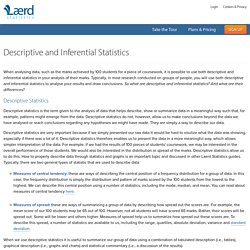
Typically, in most research conducted on groups of people, you will use both descriptive and inferential statistics to analyse your results and draw conclusions. So what are descriptive and inferential statistics? And what are their differences? Descriptive Statistics Descriptive statistics is the term given to the analysis of data that helps describe, show or summarize data in a meaningful way such that, for example, patterns might emerge from the data. Descriptive statistics are very important because if we simply presented our raw data it would be hard to visulize what the data was showing, especially if there was a lot of it.
Measures of central tendency: these are ways of describing the central position of a frequency distribution for a group of data. Amazing Study Skills Secrets And Tips for Students. Study Skills Handbook Table of Contents. Your Academic Goals Notebook [Click to Expand] Earlier, we discussed the idea of setting goals while you're in college, but did so more on a theoretical level.

Now let's get down to the nitty-gritty and talk about how to put some concrete goals down on paper and do move toward completing them. One of the best ways of doing this is by developing a goals notebook. [...] Chapter 2 - Managing your Environment[Click to Expand] In order to understand and retain information, you need to be able to concentrate on what you are studying and in order to concentrate you need a study spot that is comfortable and free of distraction.
Here are some tips and tricks to help you create a productive study space: Identify your needs. Productive Study Environments Tips for organizing our Study Area [Click to Expand] Centralize everything important to your daily life either on a bulletin board, wall space, or on the back of a door. Places to Study Besides Your Desk [Click to Expand] Getting Organized - Part 2 YES! Statistics Glossary A. Alternative hypothesis (h1): If the null hypothesis is true, then the distribution of means of samples of a particular size would have the same mean as the hypothesised population, so the two distribution curves would be centred on the same point.
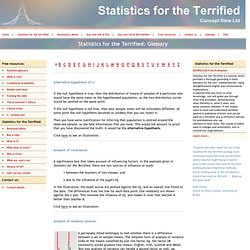
If the null hypothesis is not true, then your sample mean will be noticeably different. At some point the null hypothesis becomes so unlikely that you can reject it. Then you have some justification for inferring that population is centred around the observed sample, as the best information that you have. This would not amount to proof that you have discovered the truth: it would be the alternative hypothesis. Click here to see an illustration. Choosing the Correct Statistical Test in SPSS. What statistical analysis should I use?
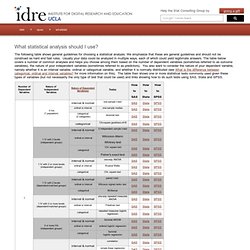
The following table shows general guidelines for choosing a statistical analysis. We emphasize that these are general guidelines and should not be construed as hard and fast rules. Usually your data could be analyzed in multiple ways, each of which could yield legitimate answers. The table below covers a number of common analyses and helps you choose among them based on the number of dependent variables (sometimes referred to as outcome variables), the nature of your independent variables (sometimes referred to as predictors). You also want to consider the nature of your dependent variable, namely whether it is an interval variable, ordinal or categorical variable, and whether it is normally distributed (see What is the difference between categorical, ordinal and interval variables?
Dependent T-Test - An introduction to when to use this test and what are the variables required. What does this test do?
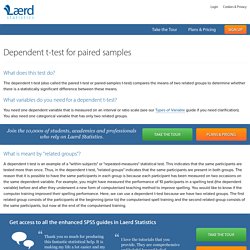
The dependent t-test (also called the paired t-test or paired-samples t-test) compares the means of two related groups to determine whether there is a statistically significant difference between these means. What variables do you need for a dependent t-test? Skills4Study.com: Study Skills. Home > Study skills > Personal effectiveness > Working with others Much of university study is organised on an individual basis.
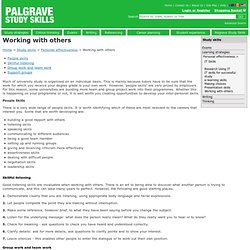
This is mainly because tutors have to be sure that the work for which you receive your degree grade is your own work. However, 'people skills' are very prized by employers. For this reason, some universities are building more team and group project work into their programmes. Whether this is happening on your programme or not, it is well worth you creating opportunities to develop your inter-personal skills.
People Skills There is a very wide range of people skills. Building a good rapport with others listening skills speaking skills communicating to different audiences being a good team member setting up and running groups giving and receiving criticism more effectively assertiveness skills dealing with difficult people negotiation skills leadership skills Skillful listening Good listening skills are invaluable when working with others. 1. 2. Sitemap for Experiment-Resources.com.